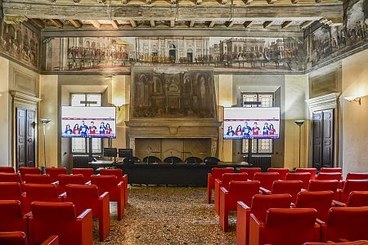Digital Twins: A Buzzword or a Reality?
Bridging the Gap between Virtual and Physical Worlds

-
Date: 10 OCTOBER 2023 from 17:30 to 19:00
-
Event location: Institute of Advanced Studies - Sala Rossa, Palazzo Marchesini, Via Marsala, 26 - Bologna - In presence and online event
-
Type: Lectures
Digitization is becoming increasingly prevalent in all aspects of our daily lives. This underlying trend has naturally brought to birth several inspiring new concepts and digital twin is one of them wildly introduced in many different areas, such as logistics, economics, robotics, healthcare, smart cities and automotive, to name a few. But what is exactly behind these pioneer works on digital twins? Are they just brilliant announcements or is there already some concrete and effective realization? The main implications relative to the design of a “digital clone” of a real-world physical system will be examined under several perspectives and targeted goals, such as simulation, design, validation, and health monitoring. Topics like 'artificial intelligence', 'cloud computing', and 'Internet-of-Things' will also be introduced because their adoption enables the digital twin to be updated in real-time. This would help in decision-making, fault prediction, and system lifetime assessment leading to cost reduction, higher reliability, and energy savings. Besides, the main features and principal challenges will be outlined. The lecture will shed light on the main ideas, reveal parallelism and differences with virtual reality and the metaverse, and inspire discussions on the impacts in the future on our life. A broad overview of digital twins’ examples will also be provided. Finally, the lecture will conclude with a vision for the future and forthcoming developments of this concept.

Speaker
ISA Visiting Fellow - Eric Monmasson
CY Cergy Paris Université, France
Visit Prof. Monmasson's web page
DO YOU WANT TO ATTEND THIS LECTURE?
-
Sala Rossa, Palazzo Marchesini, Via Marsala, 26 - Bologna
If you prefer to attend this lecture in presence, you should write to segreteria.isa@unibo.it within October 10, 12 p.m. and book your place. The places will be assigned on “first come first served” basis.
PhD students and researchers who are interested may request an attendance certificate.
The delivery of the attendance certificate requires the attendance of at least 70% of the lecture.